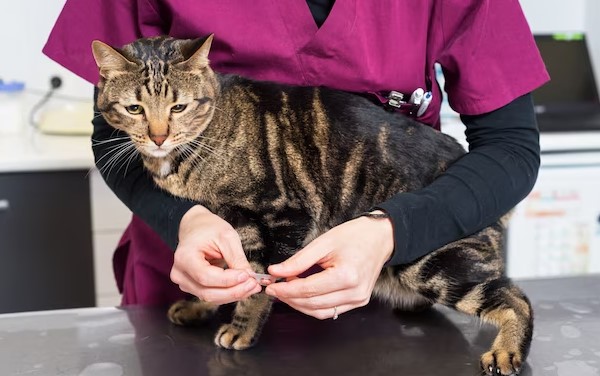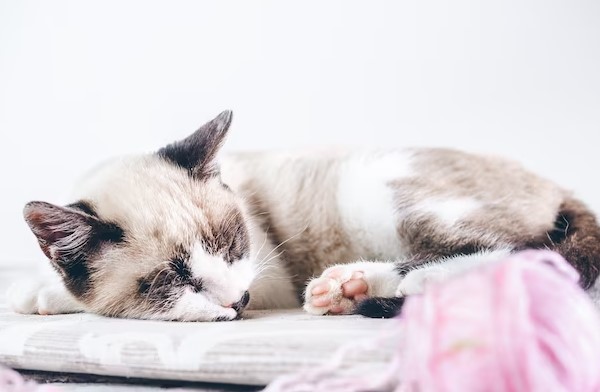Nobody wants to see their healthy cat suffering, but knowing when they’re unwell can be challenging.
If you’ve just noticed changes in your cat’s behavior or habits, taking them to the vet might be a good idea. They say that cats are notoriously difficult to diagnose as unwell, so there are some symptoms you should know about.
Below are the possible signs your cat may suffer from a sensitive stomach.
Messy Litter Box
If you notice your cat’s litter box is messier than usual, this may indicate that your cat has a sensitive stomach. Loose or wet stools, frequent visits to the litter box, and increased litter box odors can all indicate a problem.
Some cats with sensitive stomachs may have difficulty digesting certain foods or suffer from chronic diarrhea. If you notice that your cat’s litter box has become messier than it usually is, take them to the vet for a diagnosis.
If your cat has a sensitive stomach, your vet can advise you on what foods, if any, they should avoid and can provide a prescription diet or recommend other dietary changes to help your cat’s digestion. Taking care of dietary issues can help reduce the mess in your cat’s litter box.
Sudden Wight Loss
Cat owners should be on the lookout for sudden weight loss in their cats, as it is a sign that something could be wrong. One of the possible problems is that your cat may have a sensitive stomach. It could be due to a variety of conditions, such as:
- Food allergies
- Digestive issues
- Certain parasites
If you suspect your cat has a sensitive stomach, it is essential to get them to the vet immediately. It can help to diagnose and treat whatever is causing discomfort to your cat.
There’s Blood in Urine, Stool, or Vomit
Cats with sensitive stomachs present a tricky situation when they exhibit signs of blood in urine, stool, or vomit. It can be a sign of something relatively benign or something much more severe.
That’s why a veterinarian must immediately see any cat with such symptoms. It could indicate infection, inflammation, parasitic infestation, or other disease. A simple food change might be suggested, which can often cause a sensitive stomach.
Diarrhea or Constipation
Probiotics for cats with diarrhea can help alleviate symptoms associated with sensitive stomachs. Probiotics are beneficial bacteria that promote digestive health.
When a cat has a sensitive stomach, its regular diet may not digest properly, resulting in diarrhea or constipation. Probiotics help replaces beneficial gut bacteria and helps cats better absorb their food, resulting in fewer stomach issues.
Sudden Changes in Eating and Drinking Habits
When your cat has a sensitive stomach, sudden changes in its eating and drinking habits may occur. Before making any changes to their diet, it is essential to consult with your veterinarian first.
In the case of a sensitive stomach, it may be beneficial to introduce any new food slowly or in small amounts. Likewise, keeping fresh food consistent and avoiding switching between meals or brands too quickly is essential.
You should also monitor changes in water bowls should also be monitored closely. Cats may drink differently depending on the bowl type, so they must be aware of any switches and monitor their behavior.
Repeated Vomiting
If your cat has a sensitive stomach and has been vomiting multiple times, getting your pet checked out by a vet is essential. If the vomiting persists, the vet may be able to determine the root cause.
Dietary allergies and a virus are likely the cause. However, the vet may also suggest blood tests, X-rays, or scans to rule out organ or gastrointestinal blockages.
Problems with Mobility
Cats are easily motivated to move around and explore their environment but occasionally have mobility problems. Cats with sensitive stomachs can be prone to physical issues like joint and muscle pain due to weakened digestion.
It can result in weight gain from their sensitive diet. To help cats with sensitive stomachs keep their mobility, it is essential to keep them active and feed them a nutritious diet with enough protein and healthy fats. Give them supplement with joint-supporting supplements like glucosamine and fish oil.
Changes in Behavior
If your cat has a sensitive stomach, it could lead to changes in behavior. Vomiting, diarrhea, gas, and a general lack of energy are some symptoms that can result from stomach problems.

More serious illnesses, such as prolonged vomiting and weight loss, can occur if unaddressed. In cats, changes in behavior can manifest in aggression, avoidance, depression, or meowing to indicate stomach pain or discomfort.
Coughing, Panting, and Wheezing
Your cat has a sensitive stomach which can cause them to experience coughing, panting, and wheezing. It could indicate reflux or an allergic reaction to certain foods. If you notice coughing, gasping, or wheezing, you must visit your vet and have them evaluate your cat.
Treatment may include changing your cat’s diet or other medications. Additionally, keep an eye out for gradual weight loss, indicating a sensitive stomach.
By closely monitoring your cat and ensuring they receive the appropriate care and attention, you can help keep them healthy and happy.
Warning Signs that Your Cat Has a Sensitive Stomach
In conclusion, if your cat has been displaying any signs of a sensitive stomach, it’s essential to take them to the vet to determine the best course of action.
Providing better nutrition and reducing stress in your cat’s life is vital in helping them maintain a healthy digestive system. Be sure to act if problems arise; many digestive issues can quickly worsen without proper treatment.

